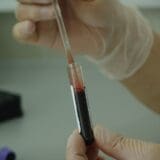Age plays a significant role in a person’s ability to conceive and have a successful pregnancy. As individuals grow older, their fertility naturally declines. This decline is more pronounced in women compared to men. Several factors contribute to reduced reproductive potential with age.
In women, the most significant factor is the decline in the number and quality of eggs in the ovaries. Women are born with a finite number of eggs, and as they age, the quantity and quality of these eggs decrease. This decline in egg quality can lead to difficulties in fertilization and implantation, increasing the chances of infertility and miscarriage.
Additionally, as women age, they are more likely to experience medical conditions that can affect fertility, such as endometriosis, fibroids, and polycystic ovary syndrome (PCOS). These conditions can make it more challenging for women to conceive and carry a pregnancy to term.
For men, while they do not experience a sudden decline in fertility like women do with menopause, their reproductive potential does decrease with age. As men age, the quality of their sperm may decline, leading to a higher risk of genetic abnormalities in offspring. Advanced paternal age has been associated with an increased risk of conditions such as autism, schizophrenia, and certain genetic disorders.
It is important to note that while age is a significant factor in fertility, it is not the sole determinant. Other factors such as overall health, lifestyle choices, and underlying medical conditions can also impact a person’s ability to conceive and have a successful pregnancy.
Understanding the impact of age on fertility is crucial for individuals who are planning to start a family. It allows them to make informed decisions about when to pursue pregnancy and explore fertility preservation options if needed. By being aware of the potential challenges associated with age-related fertility decline, individuals can take proactive steps to optimize their reproductive health and increase their chances of conceiving and having a healthy baby.
Decreased Fertility with Age
As women and men age, their fertility naturally decreases. This decline in fertility can be attributed to a variety of factors that contribute to reduced reproductive potential. In women, one of the primary factors is the decline in the number and quality of eggs as they get older. Women are born with a finite number of eggs, and as they age, the quantity and quality of these eggs diminish. This makes it more difficult for women to conceive and increases the risk of miscarriage and chromosomal abnormalities.
Additionally, women may also experience a decrease in the regularity of their menstrual cycles, which can further impact their ability to conceive. Hormonal imbalances and changes in the reproductive system can also occur with age, making it more challenging for women to become pregnant.
For men, age can also have an impact on fertility. While men continue to produce sperm throughout their lives, the quality of their sperm can decline with age. This can lead to a decrease in sperm count, motility, and morphology, all of which can affect fertility. Advanced paternal age has also been associated with an increased risk of genetic disorders and other health conditions in offspring.
It is important to note that the decline in fertility with age is not limited to women. Both men and women experience a decline in reproductive potential as they get older, although the effects may be more pronounced in women. This highlights the importance of considering age when planning for pregnancy and seeking fertility treatment if necessary.
In summary, the decline in fertility with age is a natural process that affects both men and women. Factors such as the decline in the number and quality of eggs in women, hormonal changes, and changes in sperm quality in men all contribute to reduced reproductive potential. Understanding these factors and their impact is crucial for individuals who are planning to conceive or considering fertility preservation options.
Age-Related Risks and Complications
As individuals age, there are increased risks of pregnancy complications and birth defects for both mothers and fathers. Advanced maternal age, typically defined as being over the age of 35, is associated with a higher likelihood of experiencing various challenges during pregnancy. These risks include a higher chance of miscarriage, gestational diabetes, and chromosomal abnormalities in the developing fetus.
One of the primary concerns for older mothers is the increased risk of miscarriage. The quality of a woman’s eggs decreases with age, making it more difficult for fertilized eggs to implant and develop properly. This can result in a higher rate of pregnancy loss. Additionally, older women are more likely to develop gestational diabetes, a condition that affects blood sugar levels during pregnancy. This can lead to complications for both the mother and the baby.
Furthermore, advanced maternal age is associated with a higher risk of chromosomal abnormalities in the fetus. As women age, the likelihood of having a baby with conditions such as Down syndrome increases. This is due to errors in the division of chromosomes during egg development. While the overall risk is still relatively low, it is important for older women to be aware of these potential complications and consider appropriate prenatal testing.
Paternal age also plays a role in the health of offspring. Studies have shown that advanced paternal age is associated with an increased risk of certain genetic disorders and other health conditions in children. As men age, the quality of their sperm may decline, leading to an increased likelihood of genetic mutations. This can contribute to conditions such as autism, schizophrenia, and certain types of cancer in offspring.
It is important for both men and women to be aware of these age-related risks and complications when considering starting a family. Seeking appropriate medical advice and prenatal care can help mitigate some of these risks. Additionally, individuals who are concerned about their fertility as they age may want to explore fertility preservation options, such as egg freezing or embryo cryopreservation, to increase their chances of conceiving in the future.
Maternal Age and Pregnancy Risks
When it comes to pregnancy, maternal age plays a significant role in determining the risks and challenges that women may face. As women get older, their fertility declines, and this can lead to a higher likelihood of experiencing certain complications during pregnancy. One of the primary risks associated with conceiving at an older age is an increased risk of miscarriage.
As a woman’s age advances, the quality of her eggs decreases, making it more difficult for fertilization and implantation to occur successfully. This can result in a higher rate of miscarriages, which can be emotionally and physically challenging for women and their partners. It is important for women who are considering pregnancy at an older age to be aware of this risk and to seek appropriate medical care and support.
Gestational diabetes is another potential risk that women may face when conceiving at an older age. This condition occurs when a woman’s body is unable to regulate blood sugar levels during pregnancy. Advanced maternal age is a known risk factor for developing gestational diabetes, and it can have implications for both the mother and the baby. Women with gestational diabetes may require special monitoring and dietary adjustments to manage their blood sugar levels effectively.
Furthermore, chromosomal abnormalities are more likely to occur in pregnancies of older women. As women age, the risk of having a baby with conditions such as Down syndrome increases. This is because the quality of the eggs declines, and there is a higher chance of errors in the chromosomes during the fertilization process. Genetic counseling and prenatal testing are often recommended for women who conceive at an older age to assess the risk of chromosomal abnormalities and provide appropriate guidance and support.
It is important for women to be aware of these specific risks and challenges associated with conceiving at an older age. Seeking proper medical care, undergoing necessary screenings and tests, and maintaining a healthy lifestyle can help mitigate some of these risks. Additionally, having open and honest conversations with healthcare providers about fertility and pregnancy planning can provide women with the information and support they need to make informed decisions about their reproductive health.
Paternal Age and Genetic Risks
When it comes to fertility and the health of offspring, it’s not just the maternal age that plays a role. Paternal age also has an impact on the risk of genetic disorders and other health conditions in offspring. While women are often advised to consider their age when planning for pregnancy, men should also be aware of the potential risks associated with advancing paternal age.
Research has shown that as men age, the quality of their sperm may decline. This can lead to an increased risk of genetic mutations and chromosomal abnormalities in their offspring. Studies have found that older fathers are more likely to have children with conditions such as autism, schizophrenia, and certain birth defects.
One possible reason for this increased risk is the accumulation of DNA damage in sperm over time. As men age, the genetic material in their sperm may become more prone to errors and mutations. Additionally, older men may have a higher rate of sperm with fragmented DNA, which can affect the health of the resulting embryos.
It’s important to note that while the risk of genetic disorders and health conditions may increase with paternal age, the overall likelihood of having a healthy baby is still high. The absolute risk of these conditions is still relatively low, even in older fathers. However, it’s something to consider for couples who are planning to start a family later in life.
There are also factors other than age that can influence the health of sperm. Lifestyle choices, such as smoking, excessive alcohol consumption, and exposure to certain environmental toxins, can also impact sperm quality. It’s important for men to take steps to maintain their reproductive health, such as practicing safe sex, avoiding excessive alcohol and drug use, and maintaining a healthy lifestyle.
In conclusion, paternal age can have an impact on the risk of genetic disorders and other health conditions in offspring. While the overall risk is still relatively low, it’s important for men to be aware of the potential risks associated with advancing age. By taking steps to maintain their reproductive health and making informed decisions about family planning, couples can increase their chances of having a healthy baby.
Fertility Preservation Options
Fertility preservation options are becoming increasingly popular for individuals who want to have the option of starting a family in the future. Whether it’s due to personal circumstances, medical reasons, or simply wanting to delay parenthood, there are several methods available to preserve fertility.
One common method is egg freezing, also known as oocyte cryopreservation. This involves retrieving a woman’s eggs, freezing them, and storing them for later use. When she is ready to conceive, the eggs can be thawed, fertilized with sperm, and implanted in her uterus. Egg freezing has become a viable option for women who want to preserve their fertility, especially those who may be facing medical treatments that could potentially impact their reproductive abilities.
Another option is embryo cryopreservation, which involves fertilizing a woman’s eggs with sperm to create embryos. These embryos are then frozen and stored for future use. This method is commonly used by couples undergoing in vitro fertilization (IVF) treatments, as it allows them to preserve any excess embryos for future pregnancies.
For individuals who are unable to produce viable eggs or sperm, there are alternative options available. Ovarian tissue freezing involves removing a piece of the ovary and freezing it for later use. This method is still considered experimental but shows promise for women who may not have viable eggs but still want to have a biological child in the future.
Other experimental techniques, such as artificial ovaries, are also being explored. These involve creating an artificial structure that mimics the function of the ovaries, allowing for the production and maturation of eggs. While these techniques are still in the early stages of development, they hold potential for individuals who may not have other viable fertility preservation options.
It’s important to note that while fertility preservation options are available, they are not a guarantee of future pregnancy success. The success rates of these methods vary and depend on various factors, including the age of the individual at the time of preservation and the quality of the preserved eggs or embryos. It’s essential for individuals considering fertility preservation to consult with a fertility specialist who can provide personalized guidance and information about the available options.
In conclusion, fertility preservation options provide individuals with the opportunity to preserve their fertility for future family planning. Whether through egg freezing, embryo cryopreservation, or alternative techniques, these methods offer hope for individuals who want to have the option of starting a family at a later time. However, it’s important to understand that these methods may not guarantee future pregnancy success, and consultation with a fertility specialist is crucial to make informed decisions.
Egg Freezing and Embryo Cryopreservation
Egg freezing and embryo cryopreservation are two commonly used techniques for fertility preservation. These methods offer individuals the opportunity to preserve their reproductive potential for future family planning, especially for those who may face fertility challenges due to age or medical conditions.
Egg Freezing:
Egg freezing, also known as oocyte cryopreservation, involves the extraction and freezing of a woman’s eggs for later use. The process begins with ovarian stimulation, where fertility medications are administered to stimulate the ovaries to produce multiple eggs. These eggs are then retrieved through a minimally invasive procedure known as egg retrieval.
Once the eggs are retrieved, they are carefully frozen and stored in cryopreservation tanks at extremely low temperatures. This freezing process halts the biological clock, preserving the eggs in their current state until they are ready to be used in the future.
Egg freezing offers several advantages, including the ability to preserve a woman’s eggs at a younger age when they are more viable. This can increase the chances of a successful pregnancy later in life, even when fertility declines with age. It can also provide peace of mind for individuals who may undergo medical treatments that could potentially affect their fertility, such as chemotherapy or radiation therapy.
Embryo Cryopreservation:
Embryo cryopreservation involves the freezing and storage of embryos created through in vitro fertilization (IVF). This technique is commonly used for couples who are undergoing fertility treatments and have additional embryos that are not immediately transferred to the woman’s uterus.
During the IVF process, eggs are retrieved from the woman and fertilized with sperm in a laboratory. The resulting embryos are then monitored for their development and quality. Any excess embryos that are not transferred during the initial IVF cycle can be cryopreserved for future use.
Embryo cryopreservation offers high success rates, as the embryos have already undergone fertilization and development. When the couple is ready to conceive, the frozen embryos can be thawed and transferred to the woman’s uterus, increasing the chances of a successful pregnancy.
Both egg freezing and embryo cryopreservation have shown promising success rates in recent years. The advancements in cryopreservation techniques have improved the survival rates of frozen eggs and embryos, leading to increased pregnancy rates when they are later used for conception.
It is important to note that the success of these techniques may vary depending on several factors, including the woman’s age at the time of egg retrieval or embryo creation. Younger women generally have higher success rates due to the quality of their eggs, while older women may face lower success rates due to age-related fertility decline.
In conclusion, egg freezing and embryo cryopreservation are valuable fertility preservation techniques that offer hope to individuals who wish to preserve their reproductive potential. These methods provide the opportunity to overcome age-related fertility challenges and increase the chances of a successful pregnancy in the future.
Other Fertility Preservation Techniques
Other Fertility Preservation Techniques
Aside from egg freezing and embryo cryopreservation, there are alternative options available for individuals who wish to preserve their fertility for future family planning. These techniques offer hope and possibilities for those who may not be able to conceive naturally or who want to delay starting a family.
Ovarian Tissue Freezing:
Ovarian tissue freezing is a cutting-edge fertility preservation technique that involves removing a small piece of ovarian tissue and freezing it for future use. This method is particularly beneficial for women who are about to undergo cancer treatments that may affect their fertility. After completing the cancer treatment, the frozen ovarian tissue can be transplanted back into the woman’s body, potentially restoring her fertility.
Artificial Ovaries:
Experimental techniques such as artificial ovaries are being explored as potential solutions for preserving fertility. Artificial ovaries involve creating a synthetic environment that mimics the natural function of the ovaries. This can be achieved through the use of bioengineered scaffolds or 3D-printed structures that support the growth and maturation of ovarian follicles. While still in the early stages of development, this technique shows promise for individuals who may not have viable eggs or who have undergone treatments that have damaged their ovaries.
Experimental Techniques:
In addition to ovarian tissue freezing and artificial ovaries, there are ongoing research efforts to develop other experimental fertility preservation techniques. These may include the use of stem cells to regenerate reproductive tissues, the transplantation of ovarian tissue from one individual to another, and the development of artificial gametes (sperm or eggs) through techniques such as in vitro gametogenesis. While these techniques are not yet widely available or fully understood, they represent exciting possibilities for the future of fertility preservation.
In conclusion, alternative fertility preservation techniques such as ovarian tissue freezing and experimental approaches like artificial ovaries offer hope for individuals who want to preserve their fertility. These innovative methods may provide options for those facing challenges in conceiving naturally or who wish to delay starting a family. While still in the early stages of development, these techniques hold promise for the future of reproductive medicine and offer new possibilities for individuals and couples on their journey to parenthood.
Frequently Asked Questions
- 1. How does age affect fertility?
As women and men age, their fertility decreases. Women are born with a finite number of eggs, and as they get older, the quality and quantity of those eggs decline. For men, the quality of sperm can also decrease with age. These factors contribute to reduced reproductive potential and make it more difficult to conceive.
- 2. What are the risks and complications associated with advanced maternal age?
Advanced maternal age, typically defined as being over the age of 35, is associated with increased risks of pregnancy complications. These may include a higher chance of miscarriage, gestational diabetes, high blood pressure, and chromosomal abnormalities in the baby, such as Down syndrome. It’s important for older women to receive proper prenatal care to monitor and manage these potential risks.
- 3. Does paternal age have an impact on the health of offspring?
Yes, paternal age can also have an impact on the health of offspring. Advanced paternal age has been linked to a higher risk of genetic disorders and certain health conditions in children. This is because older sperm may have accumulated more genetic mutations over time. However, the overall risk is still relatively low, and more research is needed to fully understand the extent of these effects.
- 4. What options are available for fertility preservation?
There are several options for individuals who want to preserve their fertility for future family planning. One common method is egg freezing, where a woman’s eggs are harvested, frozen, and stored for later use. Embryo cryopreservation is another option, where eggs are fertilized with sperm to create embryos before freezing. Other experimental techniques, such as ovarian tissue freezing and artificial ovaries, are also being explored.
- 5. How successful are fertility preservation techniques?
The success rates of fertility preservation techniques vary depending on factors such as age and individual circumstances. Generally, the younger the person undergoing fertility preservation, the higher the chances of success. Egg freezing and embryo cryopreservation have shown promising results, with success rates ranging from 20% to 50% per thawed egg or embryo. It’s important to consult with a fertility specialist to understand the specific success rates in your situation.











